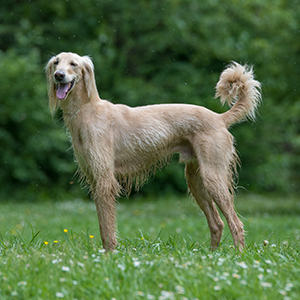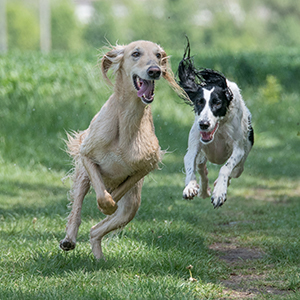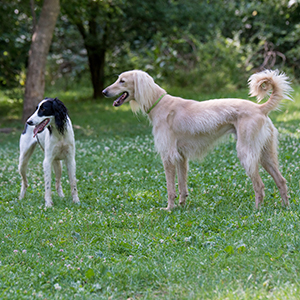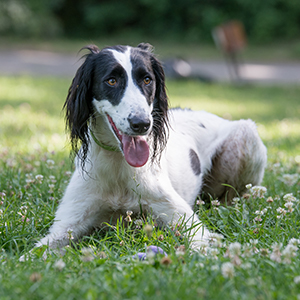
Taigan
Taigans are active, alert, intelligent dogs with versatile hunting skills. Like other sighthounds, they are gentle, even-tempered, and fast. Really fast. Taigans can run up to 60 km per hour.
Interested in discovering if your dog is a Taigan?
Check out Wisdom Panel's DNA tests.

Taigan Traits
General Appearance
The Taigan is a medium-sized dog with the distinctive look of a sighthound—slender and built for speed.
Coat and Coloring
Taigans have soft, slightly curly, medium-length coats. In the winter, they develop a thick undercoat. Their ears and tails are heavily feathered, and the thick hair on their paws resembles winter shoes. The breed comes in various colors—including white, fawn, grey, and black.
Distinctive Physical Traits
The Taigan has a long, narrow head and long legs. The breed's tail hangs like a saber with a ring at the end—a feature to Taigans. The base vertebrae of the ring are jointed, which means the tail ring cannot be unrolled.
Taigan Temperament
Taigans are balanced, independent dogs. They have a reputation for being aloof, even to people they know. But they're loyal and friendly to their families (though they seem to prefer older children).
These clever pups respond quickly to changes in their environment and usually get along with other dogs. Due to their sighthound instincts, they may chase cats or other small pets.


Taigan History
The Taigan—also known as the Kyrgyzdyn Taighany—is an ancient Asian breed. Originally from the mountainous parts of Kyrgyzstan, these dogs are now concentrated mainly in the Tien Shan region.
Developed for extreme environments, Taigans can live in areas up to 2,000–4,000 meters above sea level. Hunters often use them to hunt ibex, roe deer, foxes, badgers, and wolves. And sometimes they even work in coordination with trained birds of prey, such as the Golden Eagle.
Since the 1980s, the breed's numbers have grown in Russia—where Taigans continue to work as hunters, with their impressive visual acuity, persistence, and sense of smell. The FCI and major breed clubs do not currently recognize the breed.
Taigan Care
Nutrition
Taigans need high-quality food appropriate for their life stage (e.g., puppy, adult, senior). To help your pup stay at a healthy weight, carefully measure out their meals, and limit treats to no more than 10% of their calories.
Because of their deep chests, Taigans are at a greater risk than most breeds for bloat (also known as twisted stomach). To help prevent bloat, break your dog's food up into several meals a day, and use a food bowl specially designed to slow their eating. When timing meals, avoid feeding your pup immediately before or after any vigorous activity.
These are just a few ways you can help prevent this life-threatening condition. Ask your veterinarian about other ways—including surgical options—to prevent bloat.
Grooming
Brushing once or twice a week is usually enough to keep this breed's coat free of loose hair and dirt. When your Taigan sheds their winter undercoat, you may need to comb more frequently.
In addition to brushing, trimming nails, cleaning ears, and brushing teeth should also be part of every dog's grooming routine—regardless of breed.
Exercise
Taigans are active dogs with a lot of stamina. And they can run up to 60 km per hour. So, don't expect to keep up with them! But do plan to carve out time each day to exercise them in enclosed yards or off-leash areas far away from streets. When you're not able to run them, long daily walks will suffice.
Training
These dogs are intelligent and usually respond well to training. They can be independent and strong-willed. But when shown respect, they are willing to learn. Firm, consistent training and positive reinforcement are the best approaches for this breed.

Breed Group
Sighthound
The Sighthound Group consists of some of the oldest breeds often reserved for ownership by royalty. Sleek and built for speed and stamina, they share many of the same characteristics as those in the Sporting and Hound Groups.














